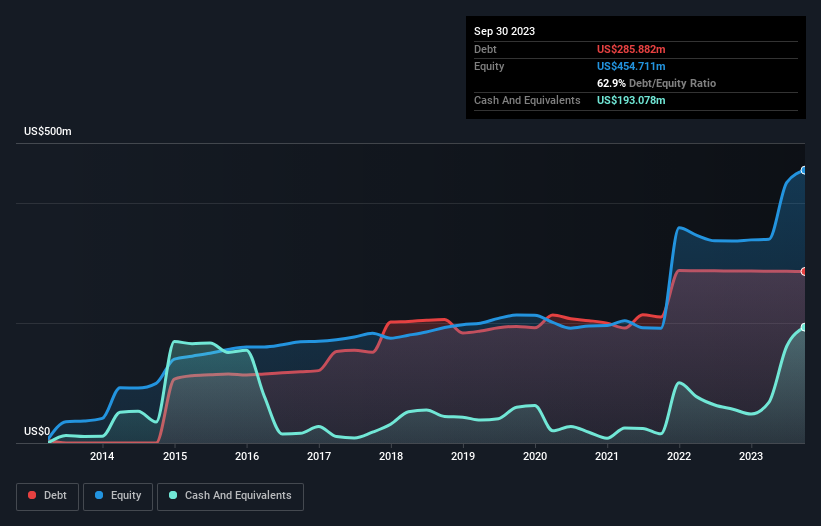- United States
- /
- Pharma
- /
- NasdaqGM:ANIP
These 4 Measures Indicate That ANI Pharmaceuticals (NASDAQ:ANIP) Is Using Debt Reasonably Well

Warren Buffett famously said, 'Volatility is far from synonymous with risk.' So it might be obvious that you need to consider debt, when you think about how risky any given stock is, because too much debt can sink a company. We can see that ANI Pharmaceuticals, Inc. (NASDAQ:ANIP) does use debt in its business. But should shareholders be worried about its use of debt?
When Is Debt Dangerous?
Debt assists a business until the business has trouble paying it off, either with new capital or with free cash flow. In the worst case scenario, a company can go bankrupt if it cannot pay its creditors. However, a more common (but still painful) scenario is that it has to raise new equity capital at a low price, thus permanently diluting shareholders. Having said that, the most common situation is where a company manages its debt reasonably well - and to its own advantage. The first step when considering a company's debt levels is to consider its cash and debt together.
View our latest analysis for ANI Pharmaceuticals
What Is ANI Pharmaceuticals's Net Debt?
As you can see below, ANI Pharmaceuticals had US$285.9m of debt, at September 2023, which is about the same as the year before. You can click the chart for greater detail. On the flip side, it has US$193.1m in cash leading to net debt of about US$92.8m.

How Healthy Is ANI Pharmaceuticals' Balance Sheet?
According to the last reported balance sheet, ANI Pharmaceuticals had liabilities of US$134.4m due within 12 months, and liabilities of US$300.9m due beyond 12 months. On the other hand, it had cash of US$193.1m and US$178.8m worth of receivables due within a year. So its liabilities total US$63.3m more than the combination of its cash and short-term receivables.
Given ANI Pharmaceuticals has a market capitalization of US$1.10b, it's hard to believe these liabilities pose much threat. However, we do think it is worth keeping an eye on its balance sheet strength, as it may change over time.
We measure a company's debt load relative to its earnings power by looking at its net debt divided by its earnings before interest, tax, depreciation, and amortization (EBITDA) and by calculating how easily its earnings before interest and tax (EBIT) cover its interest expense (interest cover). Thus we consider debt relative to earnings both with and without depreciation and amortization expenses.
ANI Pharmaceuticals has a very low debt to EBITDA ratio of 0.92 so it is strange to see weak interest coverage, with last year's EBIT being only 1.4 times the interest expense. So one way or the other, it's clear the debt levels are not trivial. Notably, ANI Pharmaceuticals made a loss at the EBIT level, last year, but improved that to positive EBIT of US$41m in the last twelve months. There's no doubt that we learn most about debt from the balance sheet. But ultimately the future profitability of the business will decide if ANI Pharmaceuticals can strengthen its balance sheet over time. So if you want to see what the professionals think, you might find this free report on analyst profit forecasts to be interesting.
Finally, a company can only pay off debt with cold hard cash, not accounting profits. So it's worth checking how much of the earnings before interest and tax (EBIT) is backed by free cash flow. Happily for any shareholders, ANI Pharmaceuticals actually produced more free cash flow than EBIT over the last year. That sort of strong cash conversion gets us as excited as the crowd when the beat drops at a Daft Punk concert.
Our View
Happily, ANI Pharmaceuticals's impressive conversion of EBIT to free cash flow implies it has the upper hand on its debt. But the stark truth is that we are concerned by its interest cover. All these things considered, it appears that ANI Pharmaceuticals can comfortably handle its current debt levels. On the plus side, this leverage can boost shareholder returns, but the potential downside is more risk of loss, so it's worth monitoring the balance sheet. The balance sheet is clearly the area to focus on when you are analysing debt. However, not all investment risk resides within the balance sheet - far from it. For instance, we've identified 2 warning signs for ANI Pharmaceuticals that you should be aware of.
If, after all that, you're more interested in a fast growing company with a rock-solid balance sheet, then check out our list of net cash growth stocks without delay.
New: Manage All Your Stock Portfolios in One Place
We've created the ultimate portfolio companion for stock investors, and it's free.
• Connect an unlimited number of Portfolios and see your total in one currency
• Be alerted to new Warning Signs or Risks via email or mobile
• Track the Fair Value of your stocks
Have feedback on this article? Concerned about the content? Get in touch with us directly. Alternatively, email editorial-team (at) simplywallst.com.
This article by Simply Wall St is general in nature. We provide commentary based on historical data and analyst forecasts only using an unbiased methodology and our articles are not intended to be financial advice. It does not constitute a recommendation to buy or sell any stock, and does not take account of your objectives, or your financial situation. We aim to bring you long-term focused analysis driven by fundamental data. Note that our analysis may not factor in the latest price-sensitive company announcements or qualitative material. Simply Wall St has no position in any stocks mentioned.
About NasdaqGM:ANIP
ANI Pharmaceuticals
A biopharmaceutical company, develops, manufactures, and markets branded and generic pharmaceutical products in the United States and internationally.
Very undervalued with moderate growth potential.


